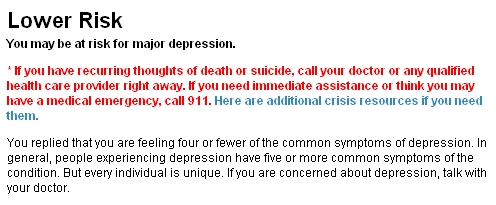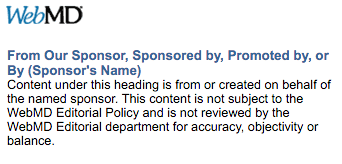One Clear-Cut Reason to Not Trust WebMD's Medical Information
By:
If you needed one reason to stop consulting WebMD — the nation's most popular health information resource — (we're looking at you, hypochondriacs), check out a 2010 investigation spearheaded by Sen. Chuck Grassley (R-Iowa) into the site's relationship with Big Pharma.
In a letter sent to the site, Sen. Grassley took issue with a quiz for depression on the site that, at the time, turned up dubiously consistent results. No matter how respondents answered the 10 questions on the quiz, which was sponsored by the pharmaceutical company Eli Lilly, the result turned up the same:
"You may be at risk for major depression." Here's a screengrab of the original results page:
 CBS - bnet.com
CBS - bnet.com
The catch? Eli Lilly also makes a popular anti-depressant called Cymbalta. As one blogger at the time astutely observed:
"This is not really a 'depression screening test' at all. Instead, it is a 'Cymbalta-requester' screening test."
WebMD's cozy relationship with pharmaceutical companies is no secret. The online medical resource makes no effort to conceal its sponsored content — the article, "Managing Osteoarthritis Knee Pain," was paid for by the Genzyme Corporation, which makes a treatment for Osteoarthritis knee pain and maintains "sole editorial control" of the article.
Here's the site's policy on the matter:
 WebMD - webmd.com
WebMD - webmd.com
In a statement to ATTN:, WebMD maintained that its sponsored content is clearly marked, and wholly separate from non-sponsored content, which is ruled by the site's own editorial policy. Sponsors, a spokesperson added, are subject to the site's advertising policy, which includes stipulations about accuracy, good taste, and publishing misleading material.
Still, it's a reputation that, according to some, should handicap the site's massive popularity. And even though egregious cases of a sponsor baiting browsers may have subsided — the depression quiz has since been altered — the site's mix of original and sponsored content still presents questions.
A dive into the site's reputation by Vox's Julia Belluz this week found that WebMD still contained dubious recommendations such as weight loss supplements to tips on losing weight — some of which were included in a crack down on supplements by the the U.S. Justice Department and the Food and Drug Administration.
According to Vox, WebMD's wight loss supplements page was updated to include alternative options after their story ran.
After the Vox article was published, WebMD released a statement about its editorial integrity:
"We are deeply disappointed by some recent coverage by Vox that called into question the accuracy and credibility of our content, and inappropriately suggested that the appearance of advertising on our site somehow influences our editorial coverage."
Update 5:40 pm EST: This piece has been updated to include a response from WebMD, and to clarify the demarcation of the site's original and sponsored content.
